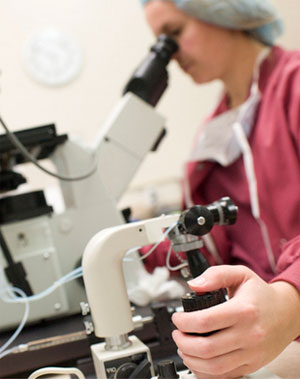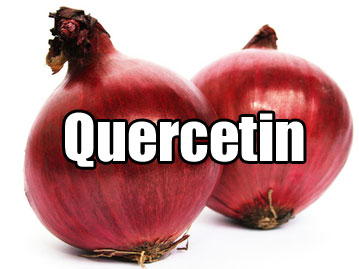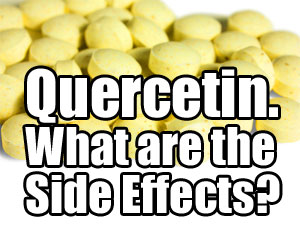There are a number of health benefits to taking quercetin, and one might assume it is safe because it is natural.
However, there are some important facts to note before consuming this antioxidant in supplement form. We’ve compiled data from several research studies. Here is what we found out.
Is Quercetin Safe?
First of all, University of Maryland Medical Center considers quercetin safe. That said, they do state two possible side effects for users to be aware of:
- Headaches
- Upset Stomach
WebMD says that quercetin has been used safely in a dosage up to 500 mg twice a day for a period of 12 weeks.
High doses of over 1 gram (1,000 mg) per day of quercetin have shown to damage the kidneys. They suggest taking breaks or cycling the supplement use rather than consuming it on a consistent basis.
According to Antioxidants.org, the Memorial Sloan-Kettering Cancer Center reports that humans have not had adverse effects from taking this supplement while consuming doses up to 4 grams.
In clinal studies, The Linus Pauling Institute at Oregon State University reported that oral supplementation of 3mg-1g quercetin glycosides per day did not result in any significant adverse effects. This may be because most flavonoids are thought to have low bioavailability. The body quickly metabolizes and eliminates them.
There is a study on PubMed that looks into the effects of excessive flavonoid intake. It suggests that “at higher doses, flavonoids may act as mutagens, pro-oxidants that generate free radicals, and as inhibitors of key enzymes involved in hormone metabolism”. Keep in mind here that they do not refer specifically to quercetin, but rather to all flavonoids in general.
Side Effects: Is Quercetin a Blood Thinner?
Another issue to be aware of is that some quercetin supplements contain bromelain.

According to Brent Bauer, M.D., at the Mayo Clinic, “Bromelain, the enzyme from the pineapple, may have anti-platelet activity. So for people taking blood thinners or who have anti-platelet activity, theoretically there could be increased risk of bleeding.”
Some people take blood thinners or have concern about the adverse effects of bromelain. They have the option of taking quercetin supplements that do not contain this ingredient.
Who Should Not Take Quercetin?
The University of Maryland Medical Center recommends that some people avoid taking this flavonol. For example, pregnant and breastfeeding women as well as people with kidney disease.
Quercetin may also lessen the effectiveness of certain medications and antibiotics. Therefore, people should consult with their doctors before using this supplement.
The Linus Pauling Institute states that flavonols (including quercetin) have shown to inhibit multidrug resistance protein, “potentially affecting MRP-mediated transport of many anticancer drugs, e.g., vincristin, etoposide, cisplatin, irinotecan, methotrexate, camptothecin, anthracyclines and vinca alkaloids.”
Do the Benefits Outweigh the Quercetin Side Effects?

Of course, this depends on the user. Do you take medications or have health issues that flavonoids could adversely impact? You may choose to not use a supplement.
Some people start by increasing their quercetin-containing food consumption (ie raw onions, apples, etc..). Eating a diet high in fruits and vegetables provides a variety of different health benefits. Therefore, you may find that this simple change resolves your issues.

